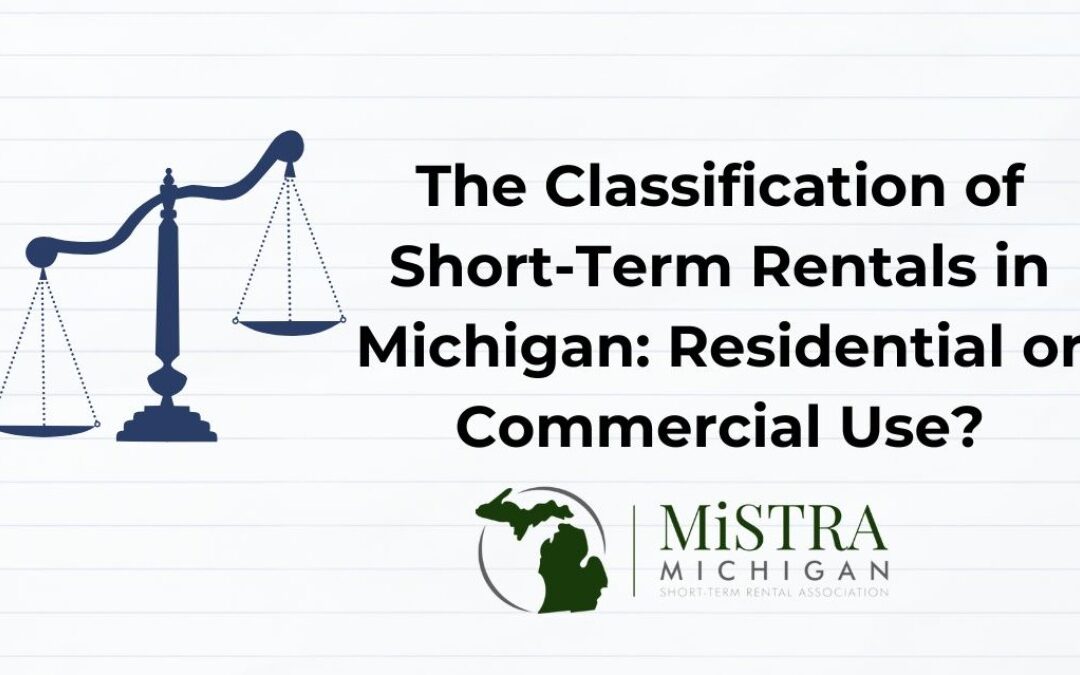In the state of Michigan, given no state-level definition, the classification of short-term rentals (STRs) as either commercial or residential use has become a hotly debated topic, influenced by ongoing lawsuits and critical for understanding land use regulations. Local ordinances typically prevent commercial activities in residential zones, but the evolving nature of how we use our homes today—from e-commerce to telecommuting—calls for a reevaluation of these traditional definitions.
Understanding the Debate
At its core, the debate hinges on how short-term rentals align with existing land use regulations that strictly segregate commercial and residential activities. Those who believe classifying STRs as commercial point to the business-like manner in which rentals are marketed and operated, suggesting they are like bed and breakfasts or hotels. Opponents, including the Michigan Short-Term Rental Association (MiSTRA), argue that STRs should be classified as residential use, pointing to the fact that by both occupancy and activity, it is consistent with the purpose of residential land use.
Modern Home Use: Beyond Traditional Boundaries
Today’s homes are multifunctional spaces. Many homeowners manage businesses right from their living rooms—from drop shipping enterprises to extensive remote work setups, day cares to group homes. As modern living reflects a broader trend where residential spaces increasingly accommodate activities that blur the lines between personal and professional use, how we evaluate and regulate needs to flex to adopt to these changes.
Comparative Impact: STRs vs. Other Home-Based Activities
To put the impact of STRs into perspective, consider other common home-based activities often permitted in residential zones, such as daycare centers. Daycares often bring more traffic and require more resources than a short-term rental property, which typically sees a turnover of guests without the same level of local traffic or infrastructure use. In fact, with an average statewide occupancy of 50% or less, most short-term rentals have less impact on traffic and resource utilization than a full-time residence. This highlightings how STRs often have less impact on neighborhoods than other allowed uses.
Legal Precedents and Local Regulations
In Michigan, the status of STRs is being actively shaped through legal challenges. These lawsuits are setting precedents that may – and already have, influenced future regulations, making it vital for stakeholders to stay informed and engaged. Local governments are wrestling with how to integrate STRs into zoning laws without stifling homeowners’ rights or disrupting neighborhood dynamics. Eager vs Peasly had a split 2-1 that short-term renting violated “commercial use” in that court case and similarly in Aldrich v Sugar Springs Property Owners Association, it was found that short-term renting was in violation of the “residential use covenants” to name 2 court cases of many.
MiSTRA’s Position: Advocating for a Modern Definition
The Michigan Short-Term Rental Association advocates for recognizing STRs as residential use. Further, MiSTRA feels current zoning laws fail to reflect the reality of our digital and mobile age, where the concept of home is evolving. Defining STRs strictly as commercial use versus evaluating the actual impact on the land and resources results in the limiting of economic opportunities and personal freedoms without the benefit of truly assessing the impact on the land and neighborhood – the purpose of zoning regulation. Evaluating any home business based on actual impact on the land and public resources would suggest that short-term rentals have no more – and potentially less, impact than full-time residency.
In short, the question of residential vs commercial in residential homes is irrelevant in today’s modern lifestyle. Any homeowner seeking to conduct business from their home should be subject to questions of impact on the surrounding land and neighborhood and utilization of public resources. By this test, STR would be found to have equal or less impact that any “typical” residential home.
To Regulate – or not.
To be clear, MiSTRA does not advocate for no regulation – every community should consider the role of short-term rentals within the larger master plan, and where necessary implement regulations to support that plan coming to fruition.
Regulating items like noise and parking should not be targeted specifically at short-term rentals; those are issues which are not specifically within the purview of STR. STR specific regulations, such as limiting the number of STR and requiring a registration process are tools that can be helpful. Further, we support that communities should have a pathway to address and deal with STR where the owner/manager is not ensuring guests are respectful neighbors while staying.
The Way Forward
As Michigan continues to navigate this issue, it is clear that any sustainable solution must consider the multifaceted role of homes today and the economic implications of STRs on local communities. Regulations need to be adaptable, ensuring safety and community well-being while also embracing the economic benefits that STRs bring to many Michigan residents.
Adjusting our approach to focus on how much traffic, waste, and public resources utilized by a home-based business can mitigate the evolving complexity of the modern world and the plethora of ways that homes have become a place of business for many.
In conclusion, the classification of short-term rentals should lean towards residential use, recognizing the modern dynamics of home use and the relatively minimal impact of these rentals compared to other home-based businesses. Such an approach would not only align with current trends but also respect the rights of property owners and contribute positively to the local economy.
Stay on top of legal and regulatory issues affecting, or potentially affecting, the short-term rental industry in Michigan > Join MiSTRA.
MiSTRA is a 501(c)6 nonprofit, member-led organization supporting the short-term rental industry in Michigan. We bring together owners, operators, management companies, and other industry stakeholders to network, learn, and elevate the industry in Michigan.

